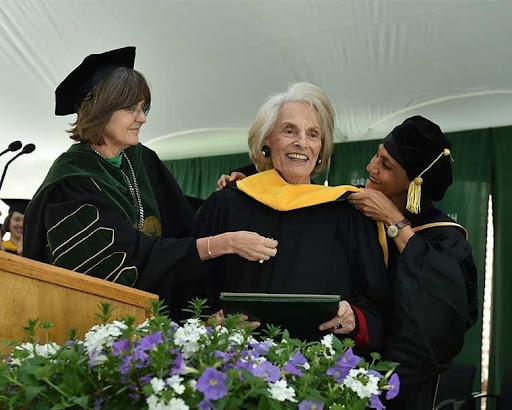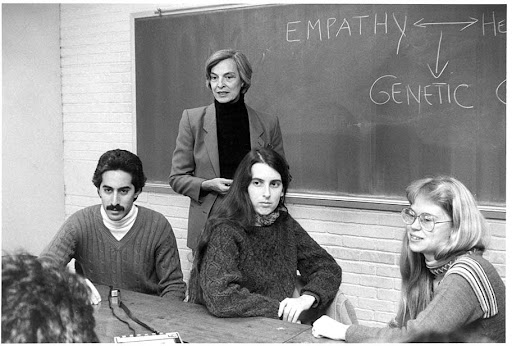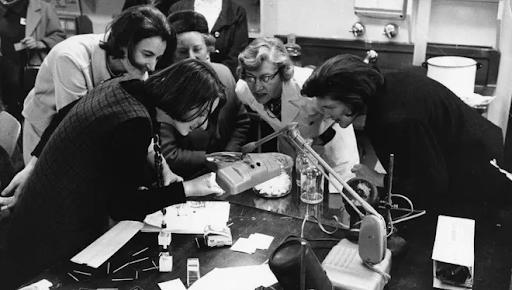
After discovery of the structure of DNA, breakthroughs were made in identifying genetic contributions to conditions. This introduced a new challenge to medicine: how to share this newfound understanding with patients, and how would patients use this new information?

Melissa Richter, a Sarah Lawrence graduate who taught psychology and biology before becoming director of the College's Center for Continuing Education, saw a great opportunity for a new type of professional, one equally conversant with the genetic science and techniques of psychological support.

Through the Years: Our History
1960s–1970s
- 1969: The idea for the program (which was under discussion but not in development at the time) received an unexpected boost when an article about genetic counseling in the New York Times Magazine incorrectly stated that Sarah Lawrence College would be establishing a genetic counseling program. The College was inundated with requests and rushed to establish the program, accepting the first students in the fall of 1969.
- 1971: The first eight students completed the program. Upon graduation, six of the graduates accepted positions as genetic counselors. The American Journal of Human Genetics referred to the program as “pioneering in the establishment of curricula dealing with the biologic, social, and psychologic aspects of genetic counseling and the graduates of the program could function effectively under the supervision of fully trained medical geneticists.”
- 1973: Joan Marks became director of the program. Marks, who was trained as a psychiatric social worker, believed genetic counselors could perform valuable functions beyond assisting physicians and gathering data. She was instrumental in evolving the program to include a stronger focus on the emotional aspects of genetics. That year, a seminar in genetic counseling was developed and taught by psychotherapist Dr. Steven Firestein, and an external Advisory Board composed of medical genetic experts was formed.
1980s–1990s
- 1981: The American Board of Medical Genetics offered the first certification exam for genetic counselors, lending greater legitimacy to the field. One quarter of the students who took the test first took an intensive review course at Sarah Lawrence.
- 1982: Of the 389 trained genetic counselors nationwide, 215 received their education at Sarah Lawrence College.
- 1988: The program continued to evolve to meet the needs of modern genetics counseling. New courses, workshops, and means of academic evaluation were added.
- 1989: The Sarah Lawrence Human Genetics program reported a 100 percent employment rate for graduates.
- 1991-1995: The number of applicants to the program increased 58 percent.
- 1997: Sarah Lawrence Human Genetics program became the first program to be accredited by the American Board of Genetic Counseling.
- 1998: Joan Marks retired and was succeeded by Caroline Lieber.
2000s-2010s
- 2013: Caroline Lieber retired. Beth Balkite served as interim director.
- 2014: Anne Greb took the helm as director.
- 2015: The program welcomed 31 students—the largest class ever to join the Sarah Lawrence genetic counseling community.
- 2018: Claire Davis succeeds Anne Greb, becoming the director in 2018.
- 2019: Joan H. Marks granted honorary doctorate. The program graduated its 1000th genetic counselor. Since its inception, Sarah Lawrence College's graduate program in Human Genetics has graduated more students than any other program. The program remains the largest in the United States.
- 2020: Lindsey Alico Ecker became co-director
As the profession grows, the program continues to innovate the training and education of genetic counselors. To carry out this mission, we rely on our large and devoted network of health care professionals. Our program is well positioned to continue to make significant contributions to the genetic counseling profession for years to come.
2020s-Present
- 2020: Lindsey Alico Ecker and Claire Davis become Co-Directors. In March 2020, the COVID-19 pandemic requires the program to shift to virtual learning. All courses move to online platforms. The largest applicant pool in the program's history is recorded.
- 2021: The program is awarded $1.8 million as part of the Warren Alpert Foundation Grant to increase diversity in genetic counseling, the most significant award to support genetic counseling education nationwide. Sept 2021 students begin to return to campus for the first time since the start of the COVID-19 pandemic. The program maintains virtual access to all classes indefinitely.
- 2022: Lindsey Alico Ecker becomes Program Director. The first Warren Alpert Scholars are enrolled in the program in Fall 2022.
- 2024: Katie Gallagher named new Program Director.